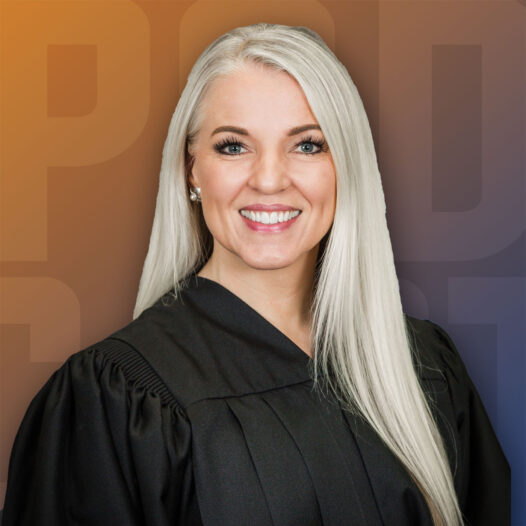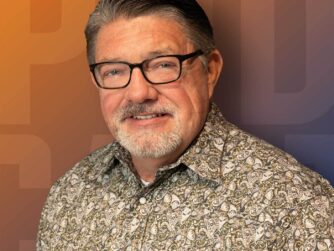Season 4, Episode 21 – Judge Echo Hutson
Welcome to Game Changers with Jeff Newkirk, where we speak with people who have done something to make this world a better place. It’s simple: inspire, educate, and let’s go change this world!
On today’s episode, Jeff welcomes guest, Judge Echo Hutson, who serves in Montgomery County in Texas in Law 4. Echo has experience in misdemeanor criminal cases, along with domestic violence and mental health court. She has a strong passion for these fields and loves to speak on domestic violence and mental health. One event she helps lead is called, “Flowers on the Lake.” Every October at sunset, they lay down carnations on the lake for the number of the year (so this year will be 2,024). They partner with multiple centers and these flowers represent the number of victims and survivors of domestic violence in their community. 1 in 3 women and 1 in 4 men will be affected by domestic violence in their lifetimes. Echo lives in the Montgomery area with her husband and youngest son, and her oldest son, Austin, is a cyber-security engineer in the army. For fun, she likes to sing and play in a band called, “Benny and the Montague!”
First, Echo shares how she started in the district attorney’s office and had to learn about victims of domestic violence and co-occurring mental health issues. The goal is to find the correct punishment, to see that justice is done, and to find the right thing for these individuals. The first hearing for individuals is at 9 AM every day and they look for evidence or flags of a mental health disorder. The state of Texas is present along with a probation officer. She is not a licensed mental health professional, but she has learned many facts about mental health on the job. The worst thing that could happen is they incarcerate someone with a serious condition or do the opposite. She has had major disagreements, but they always involve a licensed mental health professional for their professional opinions.
According to the National Alliance on Mental Illness and a recent presentation from Echo, 1 in 5 Americans live with a mental health condition. 21.1% of people experiencing homelessness have a serious mental health condition. 33.5% of US adults with mental illness also experience a substance abuse disorder. 8.3% of adults have a major depressive episode and 19% of US adults have an anxiety disorder. Suicide is the 12th leading cause of death in the US, and 90% of people who die by suicide may have had a mental health condition. 79% of suicides are males and suicide is the 2nd leading cause of death in 10-14 year olds. Suicide is the 3rd leading cause of death in 15-24-year-olds. 2 in 5 people who are incarcerated have a history of mental health issues and out of 50,000 veterans in local jails, 55% have a mental health disorder.
Mental illness is a wide range of things that can affect mood or behavior, but mental disorders are more severe conditions. There is an overrepresentation of mental disorders in the criminal justice system among those in the general population. For example, schizophrenia is an overrepresentation in the criminal justice system but is present in less than 1% of the general population. 2.8% of the population has bipolar disorder and 3.6% has PTSD. People come from traumatic situations and if it’s unresolved, people will self-medicate and be put in situations where they aren’t coping well.



Next, they discuss signs that one can look for in friends and loved ones. The average length of time from the onset of symptoms to the time someone gets help is 11 years. 75% of people develop mental health issues by the age of 24. When symptoms become ongoing and affect your ability to function, that’s a sign of a potential mental health illness. Some symptoms include: sad or down, excessive mood changes, withdrawal from friends and activities, detachment from reality, hallucinations, inability to cope with daily problems or stress, or a combination of those.
Prevention is key and they need help from an outside source. If it is a crisis, you can call a crisis hotline and get them to a provider immediately. If it’s not a crisis, then there are more resources in different countries to help them. We all go through stages of better and lesser help. We need to get rid of the stigma because there is not anything wrong with them– they just need a little extra help. If you ignore it, it won’t go away and could end up hurting you or someone else. The Texas suicide prevention lifeline number is 800273TALK and the national suicide hotline is 988. If there is a crisis, you can call 911 and if it is not an emergency, you can call 9367605800 for trained law enforcement to assess whether they need to do an emergency detention order.
Echo says if a judge can find probable cause, they can also get that person to a mental health facility for intervention. The tri-county behavioral healthcare number is 8006596994. There is also a non-profit in Montgomery County called Mosaics of Mercy, which can connect you with a mental health area provider for non-crisis situations. Their number is 3467030051.
In conclusion, Echo shares that there are so many resources available and it is a different kind of justice. You can change the world one person and one situation at a time. In a criminal court case, if they don’t agree to a plea bargain, then they go to court. They do try to weed out the people who will take advantage of saying they have a mental health illness. They first look at if the person is competent or not. Then, they look at if the person has a mental health disorder that is qualified or an intellectual disability that can be diagnosed by a mental health professional. The illness also has to be related to criminal conduct, but treatment court is not intended to fix violent people. To treat mental illness, it has to be helpful and voluntary for them. They can’t force treatment, but she can strongly guide them when appropriate. Lastly, Echo shares success stories that make a huge impact.
Learn more about Judge Echo Hutson.
Do you have any game-changers in your life? Be sure to let me know so we can celebrate their story and contribution to our world. Go to the Contact Us page to submit their name.






